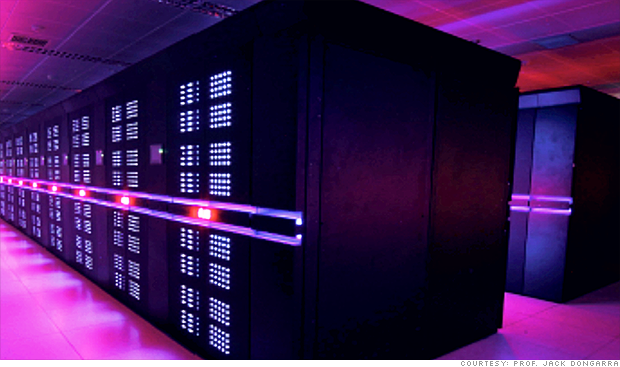Next-generation supercomputer will have 180 petaflop/s peak performance
April 9, 2015

Current fastest supercomputer, the Tianhe-2 (credit: Jack Dongarra)
The U.S. Department of Energy (DOE) has invested $200 million to deliver a next-generation supercomputer, known as Aurora, with a peak performance of 180 petaflop/s (quadrillions of calculations per second).
Scheduled for completion in 2018, Aurora will be based on a next-generation Cray supercomputer, code-named “Shasta,” and will use Intel’s HPC scalable system framework. The supercomputer will be open to all scientific users.
The current fastest supercomputer is the Tianhe-2, a supercomputer developed by China’s National University of Defense Technology, with a peak performance of 55 petaflop/s and a Rmax performance of 33.86 petaflop/s on the Linpack benchmark, according to the 44th edition of the twice-yearly TOP500 list of the world’s most powerful supercomputers. The DOE did not release an Rmax figure (the primary performance measure of supercomputer performance) for Aurora.
Key research goals for the Aurora system, expected to be commissioned in 2018 and to which the entire scientific community will have access, include:
Materials science: Designing new classes of materials that will lead to more powerful, efficient and durable batteries and solar panels.
Biological science: Gaining the ability to understand the capabilities and vulnerabilities of organisms that can result in improved biofuels and more effective disease control.
Transportation efficiency: Collaborating with industry to improve transportation systems with enhanced aerodynamics features, as well as enable production of better, more highly-efficient and quieter engines.
Renewable energy: Engineering wind turbine design and placement to greatly improve efficiency and reduce noise.
Feds block supercomputer chip sales to China
In related news, the U.S. government has put the the Tianhe-2 supercomputer center, together with National University of Defense Technology in Changsha (the system’s creators), and Tianjin center, among others, on a “Denial List,” which prevents any high technology from the U.S. to be sold to these sites, VR World reports.
“U.S. government moves accelerate the Chinese CPU roadmap while curtailing juiciest sales for Intel and other U.S. vendors,” as VR World summarized it.